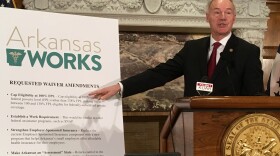An upcoming case going before the U.S. Supreme Court could permanently halt Arkansas’ first-in-the-nation work requirement for some Medicaid recipients.
The requirement mandates that people receiving health insurance through the state’s Medicaid expansion program, called Arkansas Works, report 80 hours of work per month to an online portal. By the time the requirement was put on hold in April 2019, roughly 18,000 Arkansans had lost coverage for failing to comply with the requirement.
KUAR spoke with Leo Cuello, director of health policy at the National Health Law Program, about what to expect when the Supreme Court hears arguments in the case in March.
Why is it unusual that the Supreme Court is reviewing this case in the first place?
“The Supreme Court normally takes cases for a select set of reasons. One of those, very typically, is that two different circuit courts of appeals have come to different answers on the same important legal questions, so there's a split in the circuits and the Supreme Court gets involved. In this case we don't have any circuit split.
“The second thing that is very important in this case is that the decision by the circuit court, which is a three-judge panel, was unanimous… third, and possibly most important, this case is kind of the legal equivalent of vanilla ice cream. The Supreme Court takes only a very small percentage of cases, and those are to target important, great legal debates type of cases. And this case is really about whether an agency acted correctly, and there are thousands of cases like that out there… so legally there's really nothing interesting here.”
You’ve said that the petitions don't merit review because they clearly should not be allowed to stand, so why has this case reached the Supreme Court level?
“The truth is, I'm not sure… it's very hard to know who even is asking for a review and what perspective they have. Certainly one argument we heard was that this case has happened several times in the same circuit, and that the state or [the Department of Health and Human Services] have had difficulty in transferring the case to another circuit.”
Is going before the Supreme Court really the only process to resolve this case?
“The case has been resolved. I mean, the circuit court ruled in a unanimous ruling so from my point of view at that point the case was resolved.
“It’s important for people to understand that states are making a request to implement work requirements, but this is ultimately HHS's decision. And the reason that’s significant is that when a new administration comes in, and President-elect Biden has said publicly that he is not going to continue this policy, a state could not just initiate this policy on its own. It needs to get federal approval to do it, and if President-elect Biden doesn't end up being willing to issue any approvals then that also is a way that this situation prospectively resolves itself again.”
Will the fact that Arkansas was the only state to actually implement a Medicaid work requirement potentially affect the outcome of the case?
“It certainly is a really important and relevant fact. The ultimate reason that we won these cases is that the authority the administration used to implement these work requirements is an authority that says you can run pilot programs that promote coverage. And they implemented work requirements in Kentucky that the state of Kentucky predicted would result in 95,000 people losing their health insurance, the ones in Arkansas that resulted in, in fact, 20,000 people or so losing their health insurance… so what they did very clearly was not promoting coverage.”
“You have to recognize that Arkansas was only terminating people for about a four-month window, and in that four-month window they terminated 20,000 people. And that was out of a cohort that was, ballpark, 80-85,5000 people. We're talking about a termination rate that was above 20%, so that fact should be very, very relevant to any court that is looking at the law here.”
“Does the Supreme Court want to issue a decision allowing people to have their health insurance taken away because they can't document employment when we're in the middle of a pandemic where unemployment has surged, and we have historic numbers of people still filing unemployment claims? And that's relevant not just from the kind of moral, obvious logic point of view, but it's also relevant because states are currently under a Maintenance of Effort obligation related to the stimulus money they got. And what that means is the states are actually not allowed to terminate people right now. So even if the Supreme Court did green-light this policy, it actually can't even go into effect while there's a public health emergency going on, under the current law.”
What effect could the Supreme Court's 6-3 conservative majority potentially have on the outcome of the case?
“This is actually a really complicated case for a conservative justice. Once the Supreme Court justices look more carefully at this case, what they're going to see is something that conflicts with their kind of conservative jurisprudence and doctrine— which is that agencies are restricted to the letter of the law, we want to keep agencies in check, we want to keep the bureaucracy small. And to side with the Trump Administration here, they would basically be granting agencies authority to play fast and loose with the statute.
“The statute is really clear that this authority is restricted to something that provides coverage, so either that statutory language means something or it doesn’t… so I think there are a lot of reasons why we can just not know what direction the Supreme Court would go with it.”






